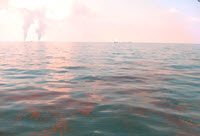
Researchers who have spent a decade studying impacts from the Deepwater Horizon incident offered their personal perspectives as they reflected upon the oil spill’s 10th anniversary in an engaging series titled “Deepwater Diaries.”
Published by the research consortium studying Ecosystem Impacts of Oil and Gas Inputs to the Gulf (ECOGIG), the diaries feature 10 scientists who candidly talked about what they were doing when the spill happened, what they have learned since then, what they wish they had known before the spill, how the Gulf of Mexico is doing now, and how the Gulf of Mexico Research Initiative (GoMRI) helped connect them to a larger research community.
Dr. Samantha Joye, ECOGIG Project Director and Regents’ Professor at the University of Georgia, shared her reflections at https://www.ecogig.org/news-item?type=N&id=207.
The scientists listed below shared their reflections at https://www.ecogig.org/news-item?type=N&id=206.
- Dr. Joseph Montoya, ECOGIG Associate Director and Professor at Georgia Institute of Technology
- Dr. Luke McKay, Assistant Research Professor at Montana State University
- Dr. Erik Cordes, Professor at Temple University
- Dr. Melitza Crespo-Medina, Researcher at Inter American University of Puerto Rico; CECIA
- Dr. Annalisa Bracco, Professor at Georgia Institute of Technology
- Dr. Kate Segarra, Coastal Science Lead for the New Orleans Regional Office at the Bureau of Ocean Energy Management (BOEM)
- Dr. Amanda Demopoulos, Research Benthic Ecologist at the U.S. Geological Survey
- Dr. Kai Ziervogel, Professor at the University of New Hampshire
- Dr. Uta Passow, Canada Research Chair at Memorial University
The ECOGIG consortium has a strong focus on engaging the public with science, and here are a few of their outreach products:
- Animated videos to share deep ocean science with kids: The Adventures of Zack and Molly
- Videos about Gulf of Mexico corals: Jewels of the Gulf: Deep-sea Coral Educational Video Series
- BBC’s Planet Earth: Blue Planet II Features Deep Ocean Research and Scientists
- Videos, blogs, photos, and printable materials at https://www.ecogig.org/multimedia.
- Educational resources at https://www.ecogig.org/get-educated
By Nilde Maggie Dannreuther. Contact maggied@ngi.msstate.edu with questions or comments.
************
This research was made possible in part by grants from the Gulf of Mexico Research Initiative (GoMRI) to The Ecosystem Impacts of Oil and Gas Inputs to the Gulf consortia ECOGIG and ECOGIG-2.
The Gulf of Mexico Research Initiative (GoMRI) is a 10-year independent research program established to study the effect, and the potential associated impact, of hydrocarbon releases on the environment and public health, as well as to develop improved spill mitigation, oil detection, characterization and remediation technologies. An independent and academic 20-member Research Board makes the funding and research direction decisions to ensure the intellectual quality, effectiveness and academic independence of the GoMRI research. All research data, findings and publications will be made publicly available. The program was established through a $500 million financial commitment from BP. For more information, visit https://gulfresearchinitiative.org/.
© Copyright 2010-2020 Gulf of Mexico Research Initiative (GoMRI) – All Rights Reserved. Redistribution is encouraged with acknowledgement to the Gulf of Mexico Research Initiative (GoMRI). Please credit images and/or videos as done in each article. Questions? Contact web-content editor Nilde “Maggie” Dannreuther, Northern Gulf Institute, Mississippi State University (maggied@ngi.msstate.edu).
